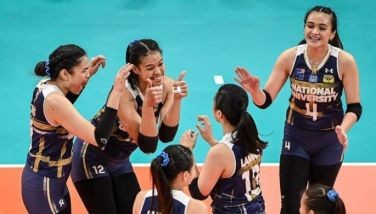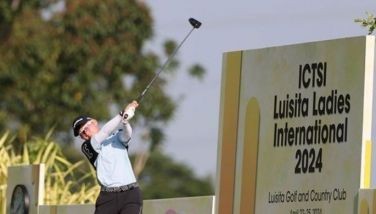Pinay sport psychologist sees total approach
Filipina Sheryll Casuga, Psy. D., has been a Certified Sport Psychologist from the Association of Applied Sport Psychology (AASP) in the US since 2011, and works independently in the San Francisco Bay area. That same year, she also won an international sport psychology award from the Asian South Pacific Association of Sport Psychology (ASPASP), the Atsushi Fujita Research Scholarship Award for her research. She is also among LinkedIn’s Top 10 certified sport psychologists in the San Francisco Bay Area for 2015.
“Sport psychology has become more mainstream in the United States and worldwide, even in just the past five years,” says Casuga, a graduate of the University of the Philippines. “With social media and advances in technology, information about sport psychology can easily be accessed by athletes everywhere. As a sport psychologist, it has been exciting to see the growth of the field and the creative ways people are applying sport psychology principles.”
Casuga, who left the Philippines to pursue her studies more than a decade ago, will be returning on March 28 to consult and meet with athletes in the country and see how she can help them break through psychological barriers to their success.
“In the Philippines, I am seeing sport psychology growing as well in the collegiate and national levels,” she explains. “I have always said that awareness of sport psychology is the key. Every time I work with an athlete, I ask, “How much of your sport performance is physical, how much of it is spiritual, and how much of it is mental?” Most dedicated athletes work hard on conditioning their body and on honing their physical sport skills,” Dr. Casuga adds. “Most Filipino athletes are also very spiritual and they pray to God to help them with their performance. The missing piece of the success triad is on mental skills training and that is where sport psychology comes in.”
Dr. Casuga has a lot of advice for those who want to dip their feet into sport psychology. According to her, it isn’t that difficult to see how it can help you perform better on the playing field. The first step is getting to know what she calls your sports mind. Awareness is the first step, shoot videos of yourself to see yourself in action.
“The best way to do this is to watch videos of both successful and less successful performances, then try to remember how one’s mindset was in both states,” she says. “Building awareness of one’s winning mindset will provide a road map to recreating these states, or what is called in sport psychology as “flow states.” It is also helpful to be aware of the body language that accompanies the winning performance. Does the body look more relaxed or more energized? Watching one’s less successful performances provide helpful information to enable self-correction. For instance, if you are made aware of a tendency to tense up your shoulders or hold your breath when having a bad performance, then you can remind yourself to relax and take deep breaths next time.”
A second helpful step is to create a pre-performance routine (PPR), a habit that sets you up to succeed. And it’s not something you can entirely duplicate from watching other athletes. It has to be personal to you.
“Every great athlete has a successful habit that works, whether they are aware of this or not. Athletes who repeatedly win have behaviors that help them win. If you have something that works, why would you not want to repeat them?” she elaborates. “Having a pre-performance routine helps athletes repeat behaviors that optimize their chances of success. A pre-performance routine is usually helpful in crucial moments in sport performance where consistency is invaluable, such as in tennis serves, free throw shots in basketball, or teeing off in golf. Developing a PPR is often personal and is different from one athlete to another. The important thing to remember in developing a PPR is the 4 C’s: Comfort, Control, Confidence, and Consistency. The routine has to be easy to do and something the athlete can control and alter if needed. The routine should be performed confidently. Lastly, the routine should be repeatable.”
Perhaps the most underused sport psychology technique is visualization. In the US and other countries, it is used not only to condition one’s mind to succeed, but to lessen fear, boost confidence, and even recover from injury through muscle memory. An athlete who has been injured can recreate how his or her body functioned when at its peak, and documented cases of more rapid recovery are commonplace.
“This is more than just a fantasy of seeing oneself cross the finish line or winning a gold medal,” Casuga says. “Proper visualization allows the user to control images and use them purposefully to optimize performance. It can be used to mentally practice when one cannot practice physically, such as when an athlete is injured. It can also be used to lessen anxiety by playing out possible mental scenarios. Visualization is a mental skill, and like all skills, need to be practiced in order to perform correctly.”
Flexing these mental muscles are crucial to successful performance, according to Casuga, particularly anxiety, which causes athletes to be paralyzed with fear, to choke when the chance for greatest success is at hand.
“Anxiety is debilitating to performance and it can compromise months or years of training. Athletes are sometimes too tensed to perform well or paralyzed by mental stress during competition,” she adds. “Athletes need to be familiar with how anxiety impacts their performance so they can address it with either relaxation techniques, self-talk, or refocusing on the task at hand. I always tell athletes that if you are not controlling your anxiety, your anxiety is controlling you.”
Casuga encourages athletes and coaches to reach out to her through her e-mail, [email protected] so she may set appointments on her two-week visit here.
“My ultimate goal is to just keep our athletes on the same playing field as other countries so they can shine and achieve. I know that many share that passion with me.”
- Latest
- Trending


























